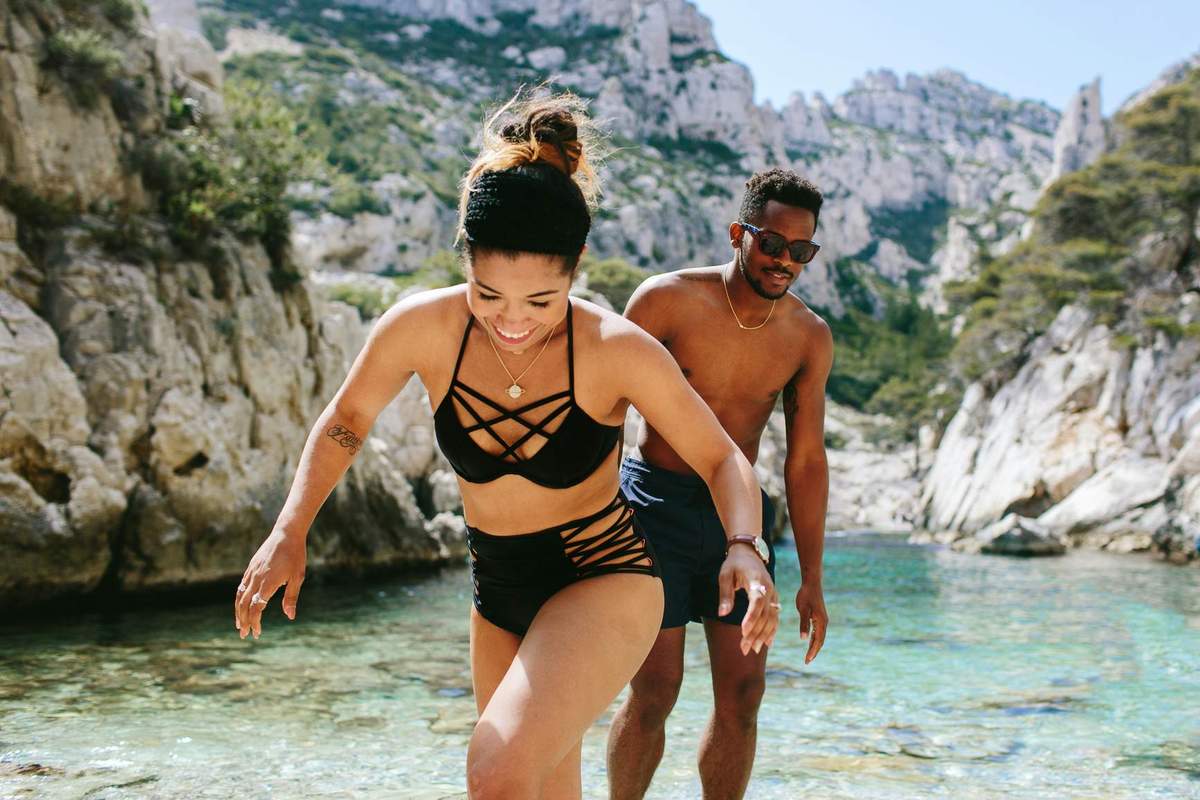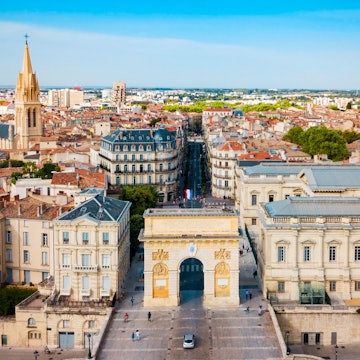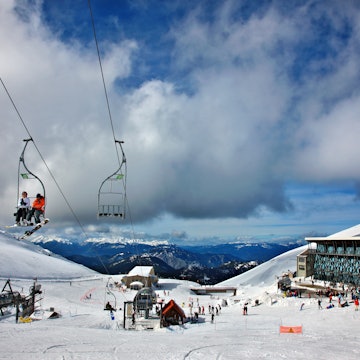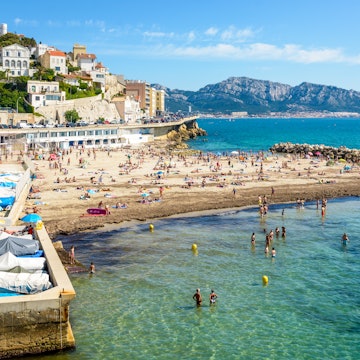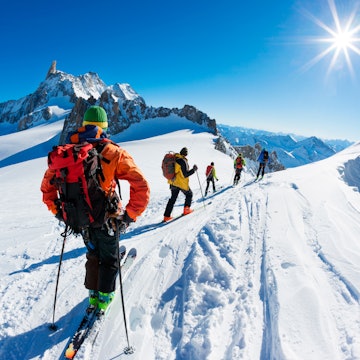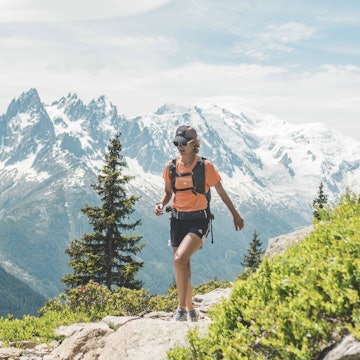

Journey through the French Pyrenees on Le Train Jaune (AKA The Canary). Getty Images
France is seriously big– more than twice the size of the UK and larger than Spain and Greece combined. With great size comes great diversity – of climate, landscape and culture. Where do you start? If you’re travelling with children and want an accessible French experience with plenty of distractions, head south.
Fronting onto the Mediterranean and backed by the Pyrenees and the Alps, the south of France is a microcosm of the wider nation, with gorgeous beaches, photogenic medieval villages and hip cities. Throw in fortresses, Roman ruins, terrific wine (for mum and dad) and a laconic pace of life, and you’ve found yourselves the perfect family holiday destination.

Head for the hills
The Pyrenees track across southwestern France, separating Spain and Portugal from the rest of Europe. In the Languedoc-Roussillon region, these peaks are an ever present backdrop. Behind the other main chunks of the south – Provence and the Côte d'Azur – the Alps ascend to further snowy heights. The skiing here is legendary, but with kids involved costs can quickly head higher than Mont Blanc, and the Chamonix après-ski club scene mightn’t be their idea of a good time.
Instead, check out the myriad little villages in the foothills, particularly the lovely Villefranche-de-Conflent and Céret in Languedoc-Roussillon. Nestled into a mountainside, Villefranche-de-Conflent is an 11th-century UNESCO World Heritage site: duck into a crêpe cafe off a cobbled laneway; explore Fort Liberia looming dramatically above the town; or ride higher into the mountains on the Train Jaune.
In the Tech River valley, Céret is just lovely, with kid-friendly cafés, giant plane trees, a busker-prone Saturday street market and a cherry festival in June (ot-ceret.fr). The fab Musée d’Art Moderne here has a terrific kids’ room with hands-on arty activities (good for a rainy afternoon).
Rugby is big in the south: most towns have a team. If you’re here in winter, take the kids along to the local stade (stadium) and watch the big men collide.
City life
France’s southern cities are energetic and stimulating – kids will enjoy the shift in gear from slow-paced mountain towns. Perpignan – or Le Centre du Monde (centre of the world) as Salvador Dali dubbed it – has a youthful vibe, with plenty of students and skaters. Wander through the old town and chase pigeons around Place de la Republique.
Inland, the stout fortress walls of Carcassonne will fire the imaginations of prospective Visigoth raiders in your entourage. Tour the ramparts on the Petit Train de la Cité (petit-train-cite-carcassonne.com), or the horse-drawn carriages run by Calèches Cité de Carcassonne (carcassonne-caleches.com).
Further east, city-centric kids’ activities include riding around Montpellier on a colourful tram or a city bike (tam-way.com); talking to the animals at Montpellier Parc Zoologique, France’s second-biggest zoo; and playing gladiators in the two-tiered Roman amphitheatre Les Arènes at Nîmes.
About 20km northeast of Nîmes, Pont du Gard is another eye-popping Roman relic. This amazing aqueduct was built around 19BC and shunted 20,000 cubic metres of water per day from Uzès to Nîmes. The stats may be lost on your kids, but the soaring 50m-high structure will leave them wide-eyed and wondering.
Heading east into Provence, swing by the Théâtre Antique and Les Arènes in Arles for more Roman reenactments. Dance across the Pont Saint Bénezet in Avignon with a full-hearted chorus of the nursery rhyme, ‘Sur le pont d’Avignion / L’on y danse, l’on y danse…’ (On Avignon Bridge, all are dancing, all are dancing…). Check out raffish seaside Marseille, France’s oldest city, from the top of an open-roofed tour bus (marseille.opentour.com). Afterwards, explore the fish market and boat-filled Vieux Port (old port).

Escape to the sea
If the sea-salty airs of Marseille appeal, continue east into the Côte d'Azur (AKA French Riviera). Check out the hyperactive markets in Vieux Nice (old town), then blow off some steam along the pebbly beaches. Ignore the glam, pay-to-paddle private beaches and head for one of the free public ones: Plage Publique des Ponchettes near Vieux Nice is a good choice.
To the southwest, the painterly port of Collioure has Catalan vibes and has long inspired artists (Matisse, Picasso, et al) with its soft Mediterranean light. Splash around in the Med, ogle the bayside battlements of the Château Royal de Collioure, or walk up to the Moulin de la Cortina (windmill) for a hilltop picnic. Nearby, Banyuls is another lovely harbour town that gets as busy as a woodpecker in summer. Visit during winter for a car park right by the sand and some beachcombing with no-one else on the shore.
Practicalities
Eating: Beware: the French put sugar into everything! Supermarket sliced bread can be sickly sweet: a baguette from a boulangerie (bakery) is a better bet. Restaurants generally welcome kids (especially cafes) and often have dedicated kids’ menus – but again, super-sugary desserts feature prominently. Kids stay up late with the adults, often hanging out in cafes until 10pm or later.
Getting around: Getting from A to B is usually the most stressful part of a family holiday. Fear not: if you don’t have a car, the south of France does public transport well. Excellent regional bus networks run town-to-town with journeys costing as little as €1. For longer trips, the excellent TGV train system (sncf.com) is fast, clean, safe and to-the-minute reliable. Trains have food carriages and tables to play cards/dominoes on. Bring the usual supply of activity books if the passing parade of stone villages, beaches, marshes, wind farms, pink flamingo flocks and vineyards fails to captivate.
Discounts: Kids receive discounted train fares and free entry to many museums and art galleries around the south of France.
Language: Arm your kids with some basic French phrases and encourage them to order a croissant or thank the waiter for the chocolat chaud (hot chocolate). Locals love it if you make an effort to speak French – especially if your kids have a go – and respond with warmth (…it’ll score you some good-parenting points too).





